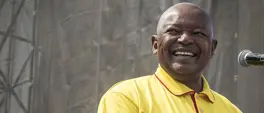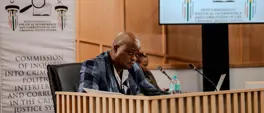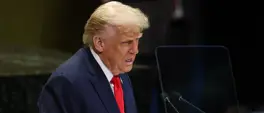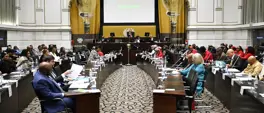CHARLES MATSEKE | Trump’s performance politics and the cost to South Africa
Charles Matseke
15 August 2025 | 11:31"Trump’s disregard for South Africa is not simply an extension of domestic U.S. polarization, it is a demonstration of how identity politics now shapes global diplomacy."
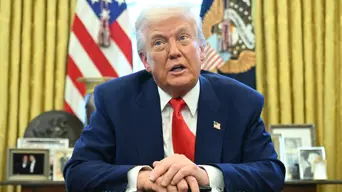
FILE: US President Donald Trump
Donald Trump’s political fabric has always been woven with threads of populist theatrics, racial grievance politics, and an impulse-driven approach to governance. Nowhere is this more evident than in his treatment or lack thereof of South Africa.
From the start of his presidency, Trump displayed neither a coherent foreign policy for Africa nor an appreciation of South Africa’s strategic role on the continent.
Instead, his engagement was dominated by misinformation and disinformation, most notably his amplification of the so-called “white genocide” narrative raising the question: was this ignorance, calculated malice, or simply a lack of diplomatic interest?
For Trump, foreign policy toward Africa has never been a matter of strategic planning but rather a stage for identity politics and symbolic gestures aimed at his domestic base.
His failure to engage meaningfully with President Cyril Ramaphosa particularly during the controversy over farm killings was not just a scheduling oversight. It was a symptom of a deeper perception problem: Trump does not see African leaders as equal political counterparts deserving of diplomatic caution or respect.
This mindset reflects his white nationalist worldview, where Black-majority nations are viewed not as strategic partners but as geopolitical afterthoughts.
In traditional U.S. foreign policy, South Africa occupies a vital position as the gateway to African markets, a regional security partner, and a voice within multilateral forums such as BRICS, the African Union, and the G20.
Under Trump, however, this relationship shifted from engagement to neglect. His administration largely abandoned Africa-focused policy frameworks in favor of ad-hoc interventions, driven more by ideological posturing than geopolitical calculus.
The “Prosper Africa” initiative ostensibly aimed at boosting U.S. trade and investment barely touched South Africa meaningfully, while Trump’s transactional worldview reduced diplomacy to short-term deals, ignoring long-term strategic benefits.
This vacuum allowed domestic and foreign actors to weaponize disinformation. Afrikaner nationalist groups such as AfriForum, with strong networks in the U.S. conservative ecosystem, saw Trump’s impulsiveness as a strategic opportunity.
Drawing from Melissa Steyn’s analysis in Whiteness Just Isn’t What It Used to Be, these groups have long grappled with the erosion of white political dominance in post-apartheid South Africa. The “white genocide” narrative provided them with an emotional hook appealing to Trump’s base and bypassing nuanced diplomatic channels.
To understand why such narratives find resonance, one must examine the historical architecture of Afrikaner nationalism.
As T. Dunbar Moodie argues in The Rise of Afrikanerdom, Afrikaner nationalism was more than a political movement it was a quasi-religious civil religion, sanctifying racial separation as divine mandate and framing political dominance as a sacred duty.
This belief system provided the moral and ideological scaffolding for apartheid and still echoes today in pockets of Afrikaner society, where victimhood narratives are deployed as political capital.
Similarly, Dan O’Meara in Forty Lost Years shows how the National Party meticulously engineered a political order that consolidated Afrikaner economic and cultural power from 1948 to 1994.
While apartheid’s political edifice collapsed, the psychological and institutional residues of this power-seeking ideology survived.
The mobilization of the “white genocide” discourse in U.S. conservative circles is not a spontaneous phenomenon, it is a strategic continuation of this long tradition of using fear, identity, and international lobbying to protect white minority privilege.
Strikingly, while Trump amplified the plight of white farmers, he never once addressed the existence of Orania, a whites-only enclave in South Africa, a relic of apartheid’s ideology of “separate development.”
Orania is the physical embodiment of white privilege and autonomy in a Black-majority democracy, yet it escapes both U.S. diplomatic scrutiny and international condemnation.
That such a place exists without sustained challenge from Washington underscores the selective outrage in U.S. foreign policy where white victimhood narratives are amplified, while systemic racial privilege is ignored.
The “white genocide” discourse is not merely rhetorical it aligns with potential economic objectives. By casting South Africa as a country hostile to white farmers and foreign investors, it creates diplomatic pressure to dilute Black Economic Empowerment (BEE) policies, opening the door for U.S. linked tech and infrastructure projects tied to white economic networks.
One cannot ignore that projects like Starlink championed in conservative U.S. circles could benefit from a South African policy environment stripped of its transformation imperatives.
For South Africa, the Trump era offers sobering lessons. First, the U.S. even as a self-styled global moral leader is not immune to racialized foreign policy. Second, populist leaders will readily sacrifice diplomatic consistency for domestic political theater, especially when racial narratives resonate with their base.
Third, foreign disinformation campaigns, particularly from well-organized minority interest groups, can gain traction when amplified by a superpower’s head of state.
Pretoria’s response must be more assertive.
It should challenge the weaponization of racial narratives by foreign actors and call out selective U.S. outrage. Domestically, it must engage Afrikaner nationalist organizations both at home and abroad on the reality that South Africa is a constitutional democracy belonging “to all who live in it,” and those seeking preferential treatment on the basis of race have no legitimate diplomatic claim.
Trump’s disregard for South Africa is not simply an extension of domestic U.S. polarization, it is a demonstration of how identity politics now shapes global diplomacy. In this paradigm, facts are subordinate to ideology, and policy is subordinate to populist performance.
For South Africa, engaging with such a superpower requires both strategic communication and an unflinching commitment to safeguarding its sovereignty against racialized policy interference.
Trump’s South Africa “policy” was never about policy at all it was about politics. And in that theatre, the truth was not a casualty of war; it was an afterthought in a performance aimed not at Pretoria, but at Pennsylvania, Texas, and Florida.
Charles Matseke (MPhil in Politics and International Relations) is a researcher and writer with a keen interest in contemporary political dynamics. His research focuses on electoral politics, foreign policy analysis, and international relations, with a particular emphasis on the Global South and Africa's role in global affairs.
Get the whole picture 💡
Take a look at the topic timeline for all related articles.
Trending News
More in Opinion
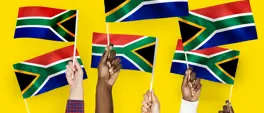
3 March 2026 11:40
Who belongs in South Africa? UCT philosopher weighs in on identity and ownership

2 March 2026 11:05
TLALI TLALI |Mandate, money and accountability - What the government website debate really reveals

27 February 2026 11:00
JAMIL F. KHAN | Human rights last on the list for global leadership agenda



